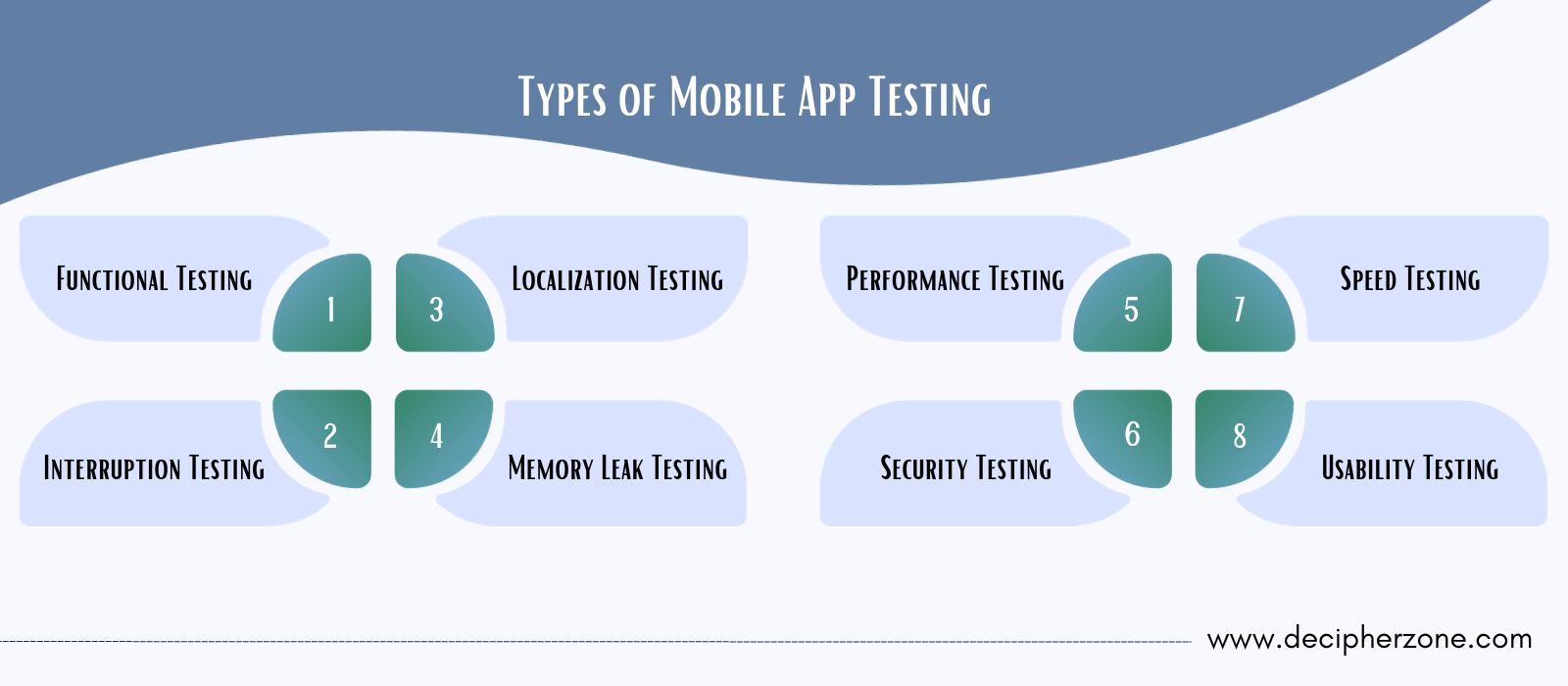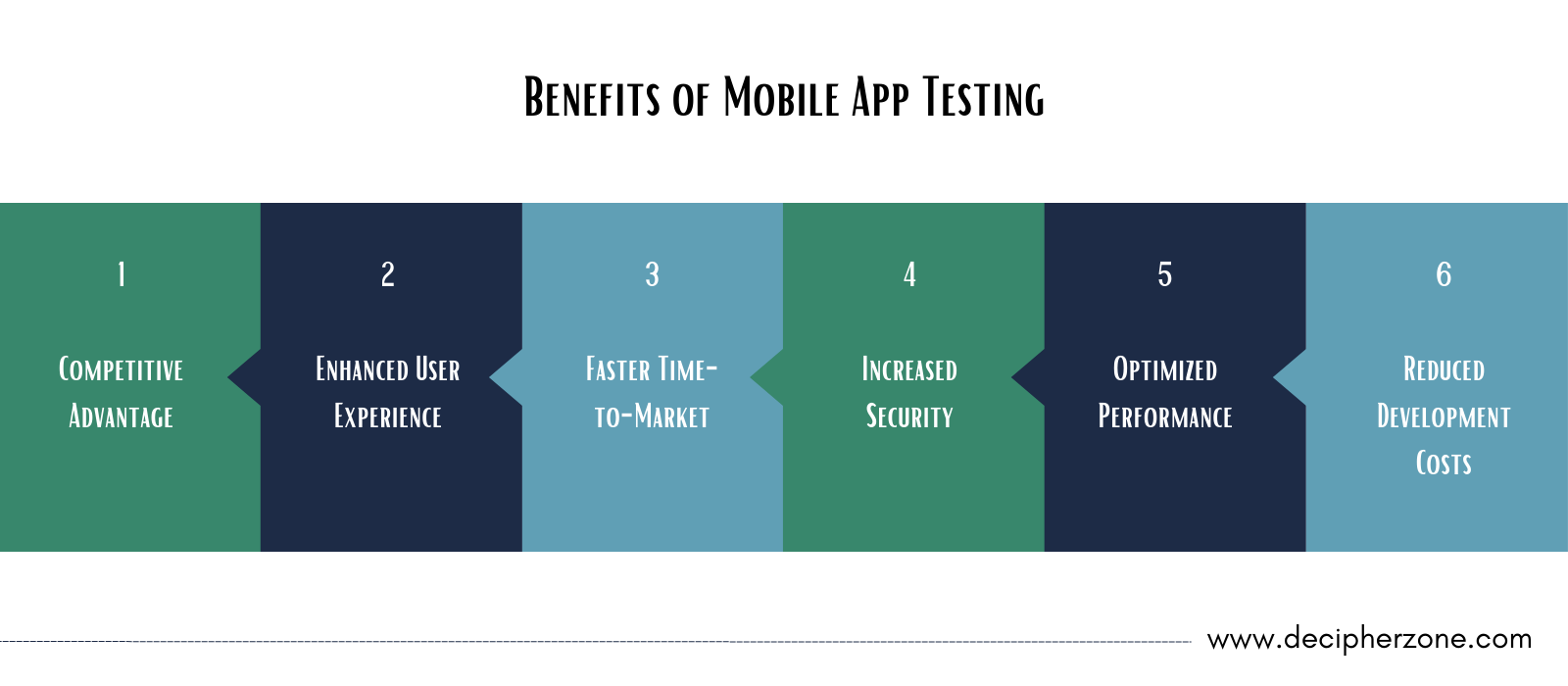Mobile App Testing - Beginners Guide to Types and Benefits. Mobile apps have been an integral part of people's daily lives by serving every purpose of life like shopping, productivity, entertainment, and many more.
However, developing a successful mobile application requires great coding skills and attention to detail alongside ensuring high-quality product with seamless performance, and this is where mobile app testing comes into play.
In this blog, we will fill you up with an introduction to mobile app testing, its different types, and its benefits, along with some of the frequently asked questions about the same.
What is Mobile App Testing?
Mobile app testing refers to the process of analyzing a mobile application based on various parameters like its performance, functionality, security, usability, as well as the overall quality of the application. I
t is an important step in the mobile app development process, that comes right after the design and development of the application where the quality assurance experts and the testers conduct various levels of testing to discover and eliminate all the potential bugs and issues alongside ensuring seamless performance and high-quality product.
Read more: 10 Types of Bugs in Software Testing
Some well-known mobile app testing tools include Selendroid, Appium, Robotium, Ranorex, TestComplete, Kobiton, BrowserStack, Eggplant, Espresso, Bug Hunter, and many more.
Read more: Types of Mobile App Development
Types of Mobile App Testing
Different types of mobile app testing cater to different requirements of the project, business, and development team with a specific purpose, ensuring that the app is error-free and performs well. Some of the common types of testing are -
-
Functional Testing
-
Interruption Testing
-
Localization Testing
-
Memory Leak Testing
-
Performance Testing
-
Security Testing
-
Speed Testing
-
Usability Testing
Read more: Top 10 Testing Tools to Consider for Web App Development
1. Functional Testing
It helps in evaluating the functionality of a mobile application by testing its various components to ensure that the application functions as pre-determined and meets the functional specifications.
It can either be manual or automated, and the key aspects of functional testing are requirements testing, UI testing, API testing, Database testing, security testing, integration testing, system testing, and regression testing.
2. Interruption Testing
Also known as resilience testing, it helps in identifying the weaknesses in the system's design or implementation, improve its overall robustness, and ensure continued functionality in the face of unexpected events by intentionally disrupting the components of a system.
The key aspects of interruption testing include automated tools, documentation, gradual scaling, iterative processes, observation and analysis, purposeful disruptions, and realistic scenarios.
Read more: What is API Testing, Types & Benefits?
3. Localization Testing
This is another type of mobile app testing that helps ensure that the application functions correctly and meets the cultural, linguistic, and regional requirements of users in a particular geographical area or target market.
The key aspects of localization testing are language and cultural adaption, UI and UX, date and time formats, currency and numerical formats, keyboard input, legal and regulatory compliance, content and graphics, functionality testing, testing across different devices and platforms, and many more.
Read more: Best Practices for Unit Testing in Java

4. Memory Leak Testing
It focuses on identifying and detecting memory leaks in an application which helps in avoiding a gradual consumption of system resources, potentially causing the program or even the entire system to slow down or crash.
Some of the key steps and techniques of memory leak testing are code review, static analysis tools, dynamic analysis tools, memory profiling, automated testing, load testing, manual testing, memory leak analysis, documentation, and many more.
Read more: Aligning Automation Testing With Manual Testing
5. Performance Testing
This type of mobile app testing helps to evaluate and ensure that the application meets specified performance criteria, such as response time, throughput, and resource utilization, under various conditions, alongside detecting the performance issues early and meeting the requirements in production environments.
The key aspects and types of performance testing are load testing, stress testing, volume testing, scalability testing, endurance testing, concurrency testing, baseline testing, benchmark testing, latency testing, and isolation testing.
Read more: How to Test Mobile App Performance?
6. Security Testing
It is a critical aspect of mobile app testing that helps identify the vulnerabilities and weaknesses in a system to ensure that it is secure against potential threats. The key aspects of security testing include vulnerability assessment, penetration testing, security scanning, authentication testing, authorization testing, data confidentiality testing, integrity testing, session management testing, API security testing, code review for security, and many more.
Read more: What is Software Maintenance: Types, Process and Cost
7. Speed Testing
This type of testing helps in identifying the bottlenecks and optimizing the performance of a mobile application, alongside delivering a positive user experience. Some important aspects of speed testing are real user monitoring, headless browser testing, load testing, isolation testing, concurrency testing, and many more.
8. Usability Testing
This is a method of evaluating a product's user interface and overall user experience by testing it with real users alongside identifying any usability issues, gathering feedback, and ensuring that the product is intuitive and user-friendly.
This testing can be conducted at any stage of the mobile app development process, and the key aspects and steps involved in usability testing include defining objectives, recruiting participants, creating test scenarios, designing test tasks, selecting testing methods, preparing testing environments, conducting a usability test, data collection, analysis and interpretation of results, generating recommendations, and many more.
Read more: Mobile App Development Cost - A Comprehensive Guide
What are the Benefits of Mobile App Testing?
When considering mobile app development, testing plays an important role which helps in ensuring that the app is error-free alongside ensuring superior performance and quality product, some of the benefits of mobile app testing are as follows -
-
Competitive Advantage
-
Enhanced User Experience
-
Faster Time-to-Market
-
Increased Security
-
Optimized Performance
-
Reduced Development Costs
Read more: Top 10 Android Frameworks for App Development in 2024
1. Competitive Advantage
The primary benefit of mobile app testing is that it helps you gain a competitive advantage in the market by offering your business a stable, reliable, and user-friendly application, which in turn positively impacts the user experience, thus helping you to grow your user base as well as revenue, enhance your reputation, alongside overall business growth.
2. Enhanced User Experience
It helps provide an enhanced user experience by allowing the developers to identify and fix the bugs on the go and improving the overall user interface design, leading to higher user satisfaction.
3. Faster Time-to-Market
Another important benefit of mobile app testing is that it helps reduce the time it takes to bring the app to market with an effective testing strategy, thus streamlining the development process by catching issues early on.

4. Increased Security
It also helps in increasing the security element of your application by identifying the vulnerabilities in the app, such as potential data breaches or unauthorized access points, and addressing these issues before the app's release to create a more secure application, alongside protecting user data and maintaining the trust of the customers.
Read more: Mobile App Architecture - A Comprehensive Guide
5. Optimized Performance
In addition, it also helps in optimizing the app’s performance by ensuring that the app functions smoothly under different conditions, such as varying network speeds and device specifications, which results in faster load times, improved responsiveness, and overall better performance.
6. Reduced Development Costs
It also helps in reducing the development costs by identifying and fixing the bugs and issues in the mobile app at an early stage, before they become a major issue in the development process, which in turn facilitates the businesses to save time, efforts, and money in the long run.
Read more: Why Invest in Mobile App Development for Your Business?
Now that you are familiar with the benefits of mobile app testing, also make sure that you go through the disadvantages as well, this will help you devise a better plan to test your mobile app and eliminate all the potential pitfalls throughout the development process (if any).
Read more: Top Mobile App Monetization Strategies to Consider
Summing It Up
Developing a full-fledged mobile application is a tedious and time-consuming process and requires attention to detail to ensure the seamless performance of the application alongside a high-quality product, testing an application at various stages helps in achieving the desired results.
So, if you are considering developing a mobile app for your business and looking for quality assurance service, why wait?
Connect with us now, or hire a Quality Analyst, and we will help you design, develop, and test the best mobile applications, tailored to your specific business needs.
FAQs about Mobile App Testing
What are the latest trends in mobile app testing?
Some of the top trends in mobile app testing are -
-
Artificial Intelligence for Testing
-
Blockchain Testing
-
DevOps and Agile Testing
-
Real Device Cloud Testing
-
Scriptless Test Automation, and many more.
What are the primary steps in the mobile app testing process?
The primary steps in the mobile app testing process include requirement analysis, test planning, test case design, execution, bugs and issues tracking, and reporting.
What are the potential drawbacks of Mobile App Testing?
The potential drawbacks of mobile app testing are conducting tests on multiple devices and platforms with different screen sizes, network conditions, and frequent updates to mobile operating systems, which in turn might make it a costly and time-consuming process.

